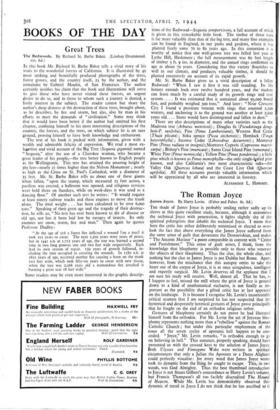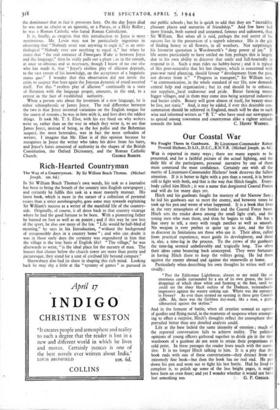The Roman Joyce
James Joyce. By Harry Levin. (Faber and Faber. 8s. 6d.) THE shade of James Joyce is probably smiling rather sadly up its sleeve at this quite excellent study, because, although it anatomises the technical Joyce with penetration, it fights slightly shy of the spiritual poltergeists that inhabit the technical Joyce. I mean that here the critic has either deliberately minimised or elected to over- look the fact that above everything else James Joyce suffered from the same sense of guilt that devastates the Dostoevskian, and makes " The Ancient Mariner " a poem comparable in content with " Crime and Punishment." This sense of guilt arises, I think, from the knowledge that blasphemy is possible only to those who venerate the objects of their blasphemy. Thus the clue, the whole clue, and nothing but the due to James Joyce is not Dublin but Rome. Apart, however, from the mischance that this autopsy omits to take the heart out of the corpse of Joyce, it is at once scrupulous, intelligent and expertly surgical. Mr. Levin deserves all the applause that I am sure his study will receive. Well, almost alt. That he has, as I happen to feel, missed the mill where the grist of Joyce is ground down to a kind of anathematical eucharist, is not finally as im- portant as the possibility that a gifted critic has at last appeared on the landscape. It is because I recognise Mr. Levin's incontestable critical acumen that I am surprised he has not suspected that the hysterical and desperately heretical gestures of Joyce prove principally that he fought on the end of an orthodox religious tether.
Gestures of blasphemy certainly do not prove he had liberated himself from the orthodox. For Mr. Levin the act of Joycean blas- phemy represents nothing more than a "rebellion " against the Roman Catholic Church ; but under this particular employment of the noun all the seven cycles of apostatic hell happen to be con- cealed. " Joyce," Mr. Levin remarks, " is orthodox enough to go on believing in hell." This sentence, properly speaking, should have presented us with the crossed keys to the solution of James- Joyce. Both Ulysses and' Finnegans Wake were written in spiritual circumstances that only a Julian the Apostate or a Dante Alighieri could perfectly visualise: for every word that James Joyce wrote took its dynamic from the thing he sought to escape. This, in two words, was God Almighty. Thus the best thumbnail introduction to Joyce is not Stuart Gilbert's concordance or Harry Levin's volume, but Francis Thompson's all too facilely discredited The Hound of Heaven. While' Mr. Leirin, has demonitiably obseived this dynamic of recoil in Joyce I do not think that he has ascribed to it the dominance that in fact it possesses here. On the day Joyce died he was not an atheist or an agnostic, or a Parsee, or a Holy Roller ; he was a Roman Catholic who hated Roman Catholicism.
It is, finally, as exegesis that this introduction to Joyce is most meritorious. Mr. Levin may not be particularly ingenious in observing that " Nobirdy avair soar anywing to eagle it," is an orni- thological " Nobody ever saw anything to equal it," but when he states that " the real romance of Finnegans Wake is between Joyce and the language," then he really pulls out a plum ; as in the remark, at once so obvious and so necessary, though I know of no one else who has made it, that " Joyce's restless play of allusion depends, to the vast extent of his knowledge, on the acceptance of a linguistic status quo." I wonder that this observation did not invite the critic to suspect that here again the Joycean dynamic of recoil asserted itself. For this " restless play of allusion " continually in a state of flirtation with the language proper, amounts, in the end, to a retreat in the face of established authority.
When a person sets about the invention of a new language, he is either schizophrenic or James Joyce. The real difference between the two is that Joyce invented variations on the English tongue for the sanest of reasons ; he was in love with it, and love does the oddest things. It took Mr. T. S. Eliot, with his eye fixed on why writers write so, rather than on the way in which they write it, to see that James Joyce, instead of being, as the hoi polloi and the Bohemian suspect, the most heterodox, was in fact the most orthodox of writers. I imagine that Mr. Eliot is of this opinion because he recognises in Joyce the writer who takes his drive from his hates, and Joyce's hates consisted of authority in the shapes of the British Constitution, the Oxford Dictionary, and the Roman Catholic



























 Previous page
Previous page